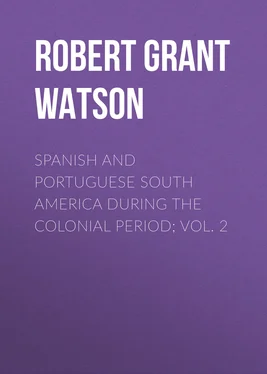Robert Grant Watson - Spanish and Portuguese South America during the Colonial Period; Vol. 2
Здесь есть возможность читать онлайн «Robert Grant Watson - Spanish and Portuguese South America during the Colonial Period; Vol. 2» — ознакомительный отрывок электронной книги совершенно бесплатно, а после прочтения отрывка купить полную версию. В некоторых случаях можно слушать аудио, скачать через торрент в формате fb2 и присутствует краткое содержание. Жанр: foreign_prose, История, foreign_edu, foreign_antique, на английском языке. Описание произведения, (предисловие) а так же отзывы посетителей доступны на портале библиотеки ЛибКат.
- Название:Spanish and Portuguese South America during the Colonial Period; Vol. 2
- Автор:
- Жанр:
- Год:неизвестен
- ISBN:нет данных
- Рейтинг книги:3 / 5. Голосов: 1
-
Избранное:Добавить в избранное
- Отзывы:
-
Ваша оценка:
- 60
- 1
- 2
- 3
- 4
- 5
Spanish and Portuguese South America during the Colonial Period; Vol. 2: краткое содержание, описание и аннотация
Предлагаем к чтению аннотацию, описание, краткое содержание или предисловие (зависит от того, что написал сам автор книги «Spanish and Portuguese South America during the Colonial Period; Vol. 2»). Если вы не нашли необходимую информацию о книге — напишите в комментариях, мы постараемся отыскать её.
Spanish and Portuguese South America during the Colonial Period; Vol. 2 — читать онлайн ознакомительный отрывок
Ниже представлен текст книги, разбитый по страницам. Система сохранения места последней прочитанной страницы, позволяет с удобством читать онлайн бесплатно книгу «Spanish and Portuguese South America during the Colonial Period; Vol. 2», без необходимости каждый раз заново искать на чём Вы остановились. Поставьте закладку, и сможете в любой момент перейти на страницу, на которой закончили чтение.
Интервал:
Закладка:
Tidings at length arrived that the long-expected Dutch fleet, with reinforcements, had passed the Canaries ; and a Portuguese prisoner who had escaped brought intelligence of its approach. Thereupon the two thousand prisoners were placed on board of dismantled ships, which were drawn under the guns of the fortress; and it was determined to await the enemy’s approach within the harbour. On the 22nd of May the Dutch fleet of thirty-four sail stood into the bay, under the delusion that S. Salvador was still held by their countrymen. The admiral, Henrik, however, was soon undeceived; but in his confusion he lost the opportunity of attacking the Spaniards and Portuguese with advantage. He stood off to the north and passed Olinda during a gale which carried him on to the Bay of Traiçam , where the natives were disposed to welcome any one who might deliver them from the hands of the Portuguese. Here he landed his sick and fortified himself; but he was disturbed by an expedition from Pernambuco and Paraïba , upon which he thought it better to re-embark his men and depart. Henrik’s fleet met with no further success. He himself died, and the remains of his unfortunate expedition found their way back to Holland.
The Spanish general, leaving a sufficient garrison in Bahia , now sailed for Europe, taking the Dutch troops with him. The fleet encountered storms, and three Spanish and nine Portuguese vessels foundered; another sank on reaching the island of St. George; whilst two were taken by a Dutch squadron. Another vessel caught fire from a captured Dutch ship, together with which it was burned. In short, Menezes, who had sailed out of the Tagus with six-and-twenty vessels, returned to that river with his own alone. The Dutch prisoners had parted from the fleet early enough to escape its disasters.
1627.
In Holland, the recovery of S. Salvador by Spain and Portugal, and the bad fortune which had attended the expedition of Henrik, had naturally the effect of considerably damping the public ardour on behalf of the West India Company; but, the Prince of Orange steadily adhering to a war policy, his views prevailed. The Spanish Government, warned by their repeated losses at sea, resolved at length to keep up a strong naval force in America; but, as was usual with them in all questions great or small, lost a considerable amount of valuable time discussing whether it would be better to equip the intended fleet in Europe or in Brazil . Whilst this point was being decided on, the Dutch admiral, Heyne, in 1627, once more entered Bahia . As it was known that he was off the coast, the governor, Oliveira, had made every preparation for its defence. In particular, two-and-forty large pieces of cannon were placed so as to bear upon the Dutch should they attempt to enter. In beating up against the wind, Heyne was so unfortunate as to run his own vessel between the two largest of the enemy’s floating batteries. But, on the other hand, he was so placed that the Portuguese could not fire upon him without endangering their countrymen; and in the course of half an hour he had sent one of the batteries to the bottom; whereupon the others struck. The Dutch, coming in boats, cut the cables of the smaller vessels and carried them out, blowing up Heyne’s ship and another. The admiral now sent four of his largest prizes to Holland, adding four others to his own fleet, and destroying the rest.
Heyne, indeed, was as fortunate as Henrik had been the reverse. After a cruise to the southward he returned to Bahia , when he undertook a most perilous enterprise in attempting to cut out four ships from one of the rivers of the Reconcave . They were some miles up the river, and although preparations had been made to intercept his return, he brought one vessel back with him and the lading of the other three. After this exploit, Heyne, having taken his departure, fell in with and captured the Spanish fleet from Mexico , thereby securing the greatest prize which has ever been made at sea, and by which the West India Company were amply reimbursed for all their former losses. As might be expected, their schemes of conquest now revived. One of their captains took possession of the island of Fernando Noronha , near Pernambuco ; but before it was effectually fortified, the Portuguese took the alarm and sent a sufficient force to crush the new settlement.
1629.
The West India Company lost no time in preparing fresh enterprises against Brazil . This time their efforts were directed on Pernambuco , from which province they estimated that one hundred and fifty vessels might annually be freighted with sugar; whilst its harbours were conveniently situated as points of departure whence their cruisers might sail to intercept more rich prizes from the Spanish Main. In order to ensure secrecy as far as possible, the preparations for their fleet were distributed over several ports, and the ships were to rendezvous at the Cape de Verds . Nevertheless, information of what was going on was brought to Lisbon, and the court of Madrid was duly warned. The governor of Brazil was accordingly instructed to place both Bahia and Olinda in a state of defence; whilst Mathias de Albuquerque was sent out from Madrid, with some men and stores, to the assistance of his brother, the captain of Pernambuco .
1630.
On his arrival at Olinda , Mathias found the place almost utterly undefended; nor did he himself do much to make things better. He had brought out the news of the birth of a prince and heir of Spain; and whilst Olinda was occupied in merry-making over this joyous event, a pinnace arrived from the Cape de Verds announcing the assemblage there of the Dutch fleet and its departure for Brazil . That fleet consisted of fifty sail, under Henrik Loncq as general and Peter Adrian as admiral. Eight of these had driven off the Spanish fleet near Teneriffe . On the 15th of February they appeared before Olinda , having on board about seven thousand men. The whole force of the town, such as it was, was collected to oppose them, and the summons which Loncq sent in was answered by a discharge of musketry. The entrance to the harbour had been blocked by sunken vessels, and the sea was so rough that the Dutch could not use their guns with effect.
But whilst a harmless cannonade was being carried on, Colonel Wardenburg, taking sixteen ships some miles to the north of the town, was able to land without opposition. Retaining only a few gunboats with eleven pieces of artillery, he divided his troops into three divisions, and on the following morning began his march towards Olinda . The news of his landing had already produced a panic, and all were anxious that their families and portable property should be placed in security in the country. Under these circumstances, Wardenburg advanced without any serious opposition, although it would have been easy in a wooded country to impede his progress. Indeed, the river Doce was itself an obstacle, and the Dutch had to delay its passage until low tide, when they forded it breast-high. At this point some shots from the gunboats caused a general stampede. The redoubt at the entrance of Olinda checked the invaders for a moment; but it was soon overcome, and the town was given up to be plundered.
Читать дальшеИнтервал:
Закладка:
Похожие книги на «Spanish and Portuguese South America during the Colonial Period; Vol. 2»
Представляем Вашему вниманию похожие книги на «Spanish and Portuguese South America during the Colonial Period; Vol. 2» списком для выбора. Мы отобрали схожую по названию и смыслу литературу в надежде предоставить читателям больше вариантов отыскать новые, интересные, ещё непрочитанные произведения.
Обсуждение, отзывы о книге «Spanish and Portuguese South America during the Colonial Period; Vol. 2» и просто собственные мнения читателей. Оставьте ваши комментарии, напишите, что Вы думаете о произведении, его смысле или главных героях. Укажите что конкретно понравилось, а что нет, и почему Вы так считаете.












